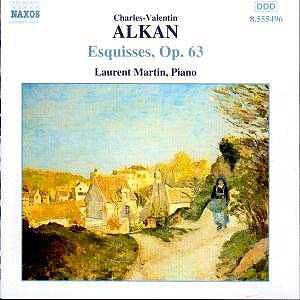This remarkable disc was originally issued in 1992
on the full price Marco Polo label. At its new price it becomes an essential
purchase. A first class recording by a first class pianist of extraordinarily
interesting music.
Before starting the detailed eulogy, a word about the
recording. I have already noted its excellent quality but listeners
should be warned that the piano is startlingly close and seems to sit
exactly across the speakers. Not between - across. The pianist can be
heard breathing from the left-hand channel and the treble strings too
can be heard from that direction. The length of the concert grand clearly
stretches across to the right-hand channel. The instrument is thus as
long as your speakers are wide. You sit a few feet back from the open
piano lid. Terrifyingly realistic!
Fortunately, Laurent Martin, a French pianist with
a special interest in this repertoire, is up to the demands both of
the microphone and the fiercer demands of Charles-Valentin Alkan. And
what demands they are. The Esquisses Op.63 last nearly 75 minutes
and whilst they may not make the sustained calls on virtuosity of the
huge Symphony for solo piano or Concerto for solo piano
that are contained within the innocently named set of twelve Études
Op.39, they do demand enormous powers of characterisation. There are
forty eight of these so called sketches, plus a postlude called
Laus Deo making forty nine tracks in all. The longest piece is
the postlude at just over 4 minutes, the shortest pieces last well under
a minute.
What could be more dull than listening to forty-nine
short movements by a renownedly eccentric romantic Frenchman? Well,
probably many activities would be more dull, because this is an enthralling
disc and I, for one, ended up listening to all of them in one go. Not
for a moment did I get bored, and I found myself frequently reaching
for the microscopic notes, plus a magnifying glass (no joke) to find
out what on earth Alkan was depicting this time. Amongst a long list
of notable portrayals are the philosophers Heraclytus and Democritus,
who are heard conversing, or perhaps arguing. Heraclytus is vindicated,
for this music is ever changing, and at amazing speed. Also striking
are Increpatio which thumps and crashes for most of its minute-and-a-half,
Ressouvenir which hypnotises the ear, Les diablotins,
a weird composition of tone clusters that had me thinking momentarily
of Nancarrow, and Pseudo-Naïveté which wanders prettily
but then stops without warning. Also present are several movements entitled
Toccata, Toccatina, Scherzetto and Scherzettino,
which show the amazing virtuoso writing with which we associate the
Alkan of the Grande Sonate: Les Quatres Âges.
Keith Andersonís notes are excellent and very necessary
if, like me, youíve not come across these particular pieces before.
Naxos continues to fly the flag for thorough documentation which should
put practically all the competition to shame, and they still find time
to provide a great Camille Pissarro on the front cover. Brilliant!
Dave Billinge


